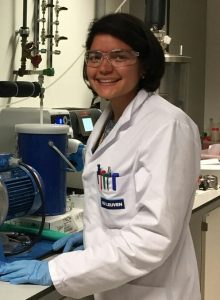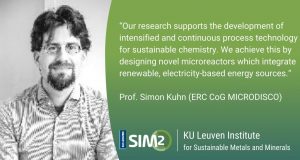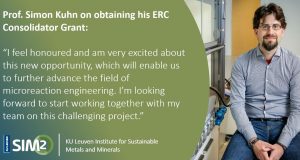— Heidy Ramirez, Arkema
It has been two months since I moved to Leuven, Belgium for my secondment at KU Leuven. Wait a moment… why am I in Belgium and what is a secondment? Marie Curie projects are characterized by international mobility, intersectoral and multidisciplinary exchange; a secondment is a short period of time in which the ESR is received by another institution of the consortium (university and/or company) to receive training on different science and technology skills. In other words, I moved to another country for a few months to learn about a specific subject that is related to my project.
Let’s put aside scientific things for a moment and talk a little about what it means to start a secondment. From my experience, it is one of the most exciting periods of the PhD, full of challenges and, as the tittle states, adventures. It is the perfect time to promote exchange between the ESRs and acquire knowledge on your subject from other institution. This mobility will not only give you academic knowledge, but will also allow you to acquire life skills that can help you adapt in different situations and environments. However, it is not all a bed of roses… Why? I will give you some examples (from my experience) and, at the same time, useful tips to prepare for your secondment and make the most out of it.

It all starts with the need of looking for a place to live. Finding accommodations for a short period of time is not an easy task. How do you explain to a landlord that you need only one or two months? Short-term accommodations are less common and in some cases more expensive. However, it is always possible to find a nice place. I recommend to start searching with enough time in advance. Ask the ESR who lives in the city, or even your future supervisor for recommendations. They know the city better than you. Try to contact university housing services. In most cases, they offer accommodations for short periods of time.
An important point for the secondment is to define clear and concise objectives according to the time. You are going to hear frequently “it is not enough time to get results”. It is not true! Everything depends on what you define as goals at the beginning of the secondment. Keep in mind that you are not going to do all the PhD research in a couple of weeks, it is just a part of the entire research. I suggest organizing a meeting with the supervisor(s) as soon as you start the secondment, in order to establish real objectives, always taking into account the deliverable at the end of the secondment (paper, report, etc.).
A key point to make the most of your secondment is to stay in contact with your host institution and main supervisor(s). Remember that the secondment is not an isolated period. It is related to the work in your host institution at some point. There should be a common thread. I recommend reporting frequently what you are doing and the results you find. In case things are not going as you expected, it will help you re-orientate the work with the purpose of achieving a goal.
Finally, my main advice to you is to enjoy the experience as much as you can! Work hard but have fun as well. Visit the city, meet new people, discover different food and learn a few sentences in the country’s language. Stay motivated even if work is going in other direction. Remember, everything is part of your formation as a PhD student! As I say: PhD life!




